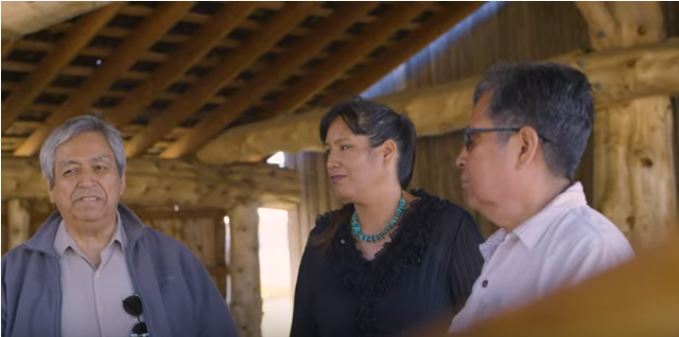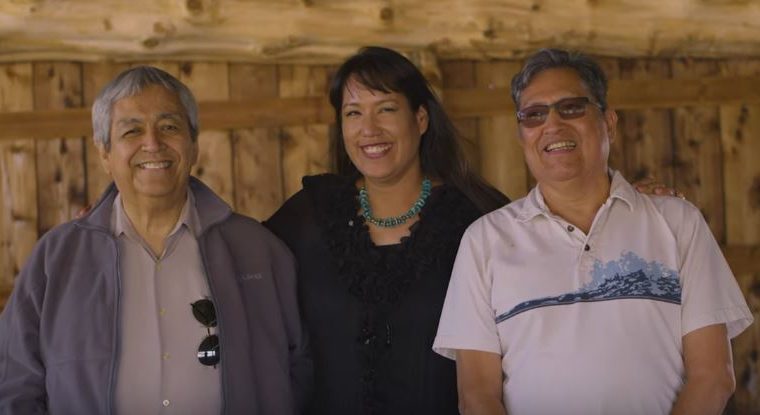*These videos and all photos in relation to them were taken in 2019 before COVID-19*
According to the Centers for Disease Control (CDC), an estimated 3,000 American Indians/Alaska Natives were living with HIV in 2017. That same year, UIHI conducted a survey in Seattle to better understand what knowledge, attitudes, and beliefs urban Native communities have about HIV/AIDS prevention. Of the participants, 39% felt they could not talk about HIV openly while only 12% had been tested in the past year.
In response to this data, UIHI created a series of culturally attuned educational tools and resources for HIV/AIDS education. These materials which also aim to dismantle the stigma which surrounds HIV/AIDS include a guide for people living with HIV during COVID-19, information about pre-exposure prophylaxis (PrEP), and a short film. The film, “Positively Native,” features the stories of three Native people living with HIV/AIDS. Over the course of the film, they discuss their personal experiences living with HIV, and how they worked towards overcoming the HIV stigma in their community.
When “Positively Native” was first released, UIHI also accompanied it with a facilitation guide and discussion presentation. These tools sought to provide community members with the tools needed to have healthy, productive discussions around HIV/AIDS. In order to promote further discussion, UIHI has selected a series of clips from the film to create a social media toolkit for organizations to use when discussing HIV/AIDS. The toolkit includes a variety of sample messaging which can be used when sharing these clips and starting a conversation about HIV/AIDS.
“I just knew that the reason Natives are the most underserved is because we’re not speaking up. We’re not making our voices heard,” said Bill Hall (Tlingit), one of the film’s subjects. “Somebody had to step up and start talking. And that was really hard to do. That was not an easy decision for me.”
All three of the film’s subjects discuss at varying points how difficult it can be to start a conversation about HIV/AIDS and the impact that it can have on one’s life and the Native community. Bill emphasizes the importance of having honest, safe conversations about HIV/AIDS. He wants to make sure people understand that when someone is diagnosed with HIV/AIDS, they are still that same person as they were before the diagnosis—they do not become their disease.
“This is your son. This is your daughter. This is the kid you loved as a child,” said Bill. “They are no different now because they have HIV and until we start doing something, our people are gonna die.”
Knowing that HIV/AIDS doesn’t change who your loved ones are is important, and it helps to dismantle the stigma which has followed the disease around for decades. Furthermore, there are new medications, such as PrEP, which mean that HIV/AIDS is no longer the death sentence it was once thought to be.
“We’re testimony, sitting here. We’re long-term survivors. [Don’t] let anybody convince you that you’re going to roll over and die tomorrow,” said Shana Cozad (Kiowa), a long-term survivor of HIV/AIDS. “[Get] good access to care, a good thorough understanding of how your immune system works and how the medications work. And, if available, how you can incorporate traditional methodologies, that you can live with this disease.”
Shana believes that communication is important because it creates an invaluable support system. She wants people to know that there is an existing community of people who have been diagnosed with HIV and have experiences and stories to share.
“It’s important for the new generation of people who are being diagnosed with this to understand that there is 30 plus years of experience,” she said. “That there are elders, there are other Native people that are available to talk to about this. The more talking and the more sharing the better and that we’re there to help each other.”
In addition to the effort to normalize conversations centered around HIV/AIDS in an attempt to end the stigma, “Positively Native” also touches on points about self-acceptance. Part of that is integrating with an already existing community and learning from people with experiences navigating life after an HIV/AIDS diagnosis, like Shana explains, but another part of that is how a community’s reaction can really impact the way a person perceives themselves and is able to practice self-love. As important as starting a conversation is practicing acceptance and love.
Hamen Ides (Lummi), the last of the three people interviewed for the film, discussed this, using his sexual orientation as an example of how the people surrounding him were able to positively impact his life and self-perception through their acceptance of him and who he was.
“I knew I was gay from the time I was in the sixth grade. It was just who I was, and my parents accepted me for that,” said Hamen Ides (Lummi). “There was no shame on that, so I was able to grow up thinking ‘Well, this is who I am, you know? It’s okay.’ So, I was really fortunate to have that in my life and I’ve been able to carry that throughout my lifetime.”
This sort of community and self-acceptance can really impact how a person can view themselves after what may seem, as Shana phrased it, like a death sentence. Realizing that HIV/AIDS isn’t the death sentence it once was is important, but so is showing loved ones that they are still loved. That’s why it’s so important to open up and have the sorts of conversations which UIHI hopes these video clips will inspire
“The first step is to get a conversation going, to plant that seed in somebody’s mind,” said Bill. “Doesn’t have to be everybody who sees it. But if it plants a seed in one person’s mind the devastating impact the stigma has on Native people, they’ll do something.”
Talking about HIV/AIDS and showing acceptance and love for people living with the disease empowers them.
“I was created out of love. And I know that that’s what I’m supposed to do. That’s why I’m here. I know that that’s why I’ve been able to live with AIDS for 24 years, because I have that spiritual inner strength. Life can throw whatever it wants at me ‘cause I’ll knock it down,” said Hamen. “I’ll knock it down.”


